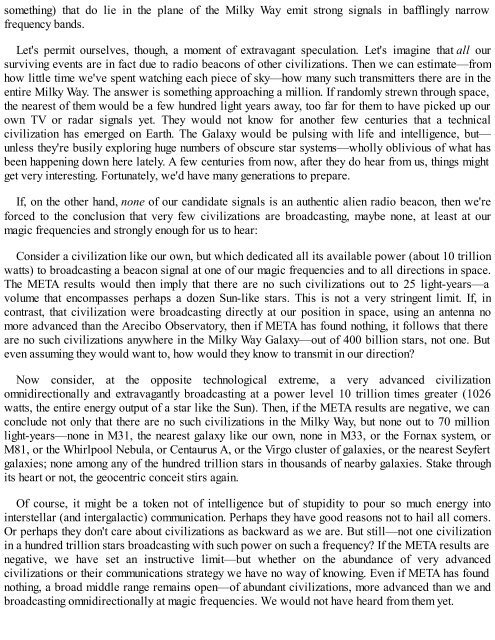Pale Blue Dot ( PDFDrive.com ) (1)
You also want an ePaper? Increase the reach of your titles
YUMPU automatically turns print PDFs into web optimized ePapers that Google loves.
something) that do lie in the plane of the Milky Way emit strong signals in bafflingly narrow<br />
frequency bands.<br />
Let's permit ourselves, though, a moment of extravagant speculation. Let's imagine that all our<br />
surviving events are in fact due to radio beacons of other civilizations. Then we can estimate—from<br />
how little time we've spent watching each piece of sky—how many such transmitters there are in the<br />
entire Milky Way. The answer is something approaching a million. If randomly strewn through space,<br />
the nearest of them would be a few hundred light years away, too far for them to have picked up our<br />
own TV or radar signals yet. They would not know for another few centuries that a technical<br />
civilization has emerged on Earth. The Galaxy would be pulsing with life and intelligence, but—<br />
unless they're busily exploring huge numbers of obscure star systems—wholly oblivious of what has<br />
been happening down here lately. A few centuries from now, after they do hear from us, things might<br />
get very interesting. Fortunately, we'd have many generations to prepare.<br />
If, on the other hand, none of our candidate signals is an authentic alien radio beacon, then we're<br />
forced to the conclusion that very few civilizations are broadcasting, maybe none, at least at our<br />
magic frequencies and strongly enough for us to hear:<br />
Consider a civilization like our own, but which dedicated all its available power (about 10 trillion<br />
watts) to broadcasting a beacon signal at one of our magic frequencies and to all directions in space.<br />
The META results would then imply that there are no such civilizations out to 25 light-years—a<br />
volume that en<strong>com</strong>passes perhaps a dozen Sun-like stars. This is not a very stringent limit. If, in<br />
contrast, that civilization were broadcasting directly at our position in space, using an antenna no<br />
more advanced than the Arecibo Observatory, then if META has found nothing, it follows that there<br />
are no such civilizations anywhere in the Milky Way Galaxy—out of 400 billion stars, not one. But<br />
even assuming they would want to, how would they know to transmit in our direction?<br />
Now consider, at the opposite technological extreme, a very advanced civilization<br />
omnidirectionally and extravagantly broadcasting at a power level 10 trillion times greater (1026<br />
watts, the entire energy output of a star like the Sun). Then, if the META results are negative, we can<br />
conclude not only that there are no such civilizations in the Milky Way, but none out to 70 million<br />
light-years—none in M31, the nearest galaxy like our own, none in M33, or the Fornax system, or<br />
M81, or the Whirlpool Nebula, or Centaurus A, or the Virgo cluster of galaxies, or the nearest Seyfert<br />
galaxies; none among any of the hundred trillion stars in thousands of nearby galaxies. Stake through<br />
its heart or not, the geocentric conceit stirs again.<br />
Of course, it might be a token not of intelligence but of stupidity to pour so much energy into<br />
interstellar (and intergalactic) <strong>com</strong>munication. Perhaps they have good reasons not to hail all <strong>com</strong>ers.<br />
Or perhaps they don't care about civilizations as backward as we are. But still—not one civilization<br />
in a hundred trillion stars broadcasting with such power on such a frequency? If the META results are<br />
negative, we have set an instructive limit—but whether on the abundance of very advanced<br />
civilizations or their <strong>com</strong>munications strategy we have no way of knowing. Even if META has found<br />
nothing, a broad middle range remains open—of abundant civilizations, more advanced than we and<br />
broadcasting omnidirectionally at magic frequencies. We would not have heard from them yet.


